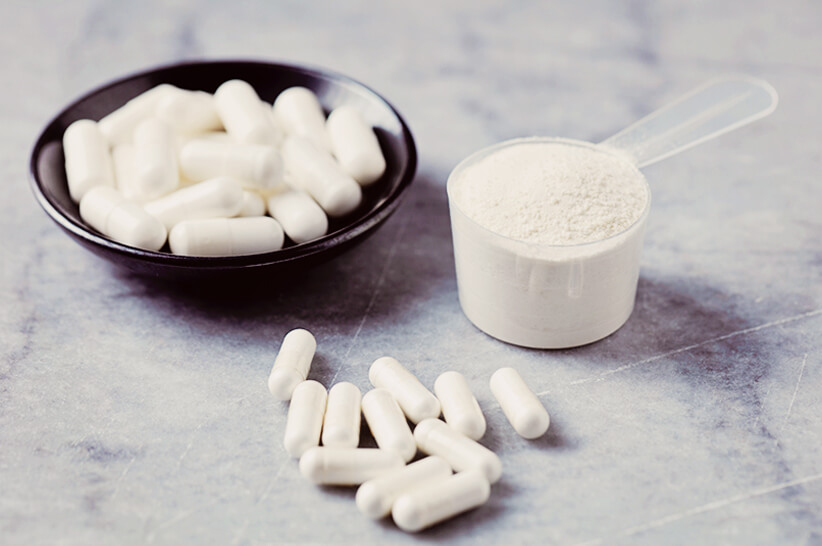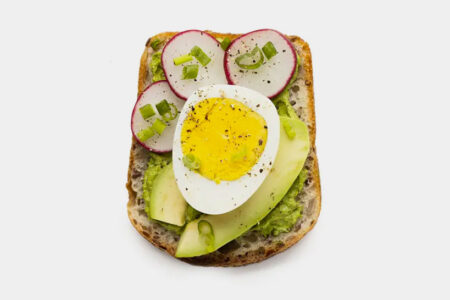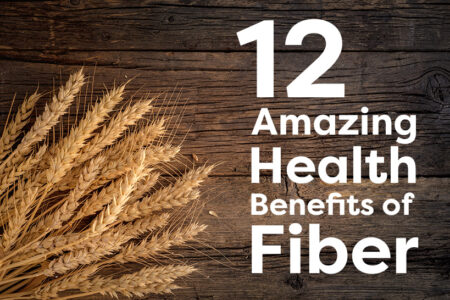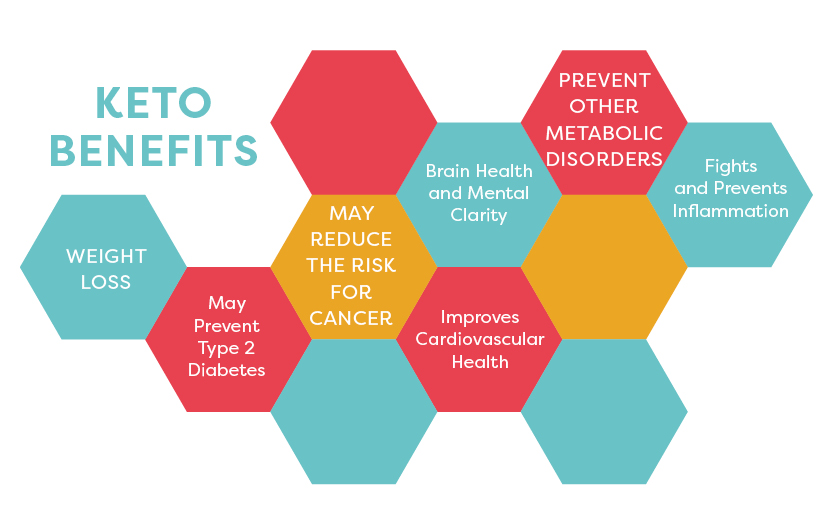We created this beginner-friendly guide that answers all the common basic questions about the ketogenic diet. If this is your first time to try it, you’ll find everything you need to know right here.
If you’re considering going on the keto diet, you’ll want to make sure you know everything about how it works, what you eat and avoid, and how the transitional period feels before swapping carbs for fat and going all in.
And to be fair, the keto diet can be pretty restrictive, so you’ll need to be in the right mental space when starting out, especially if your diet happens to be extra high in carbs and sugar to begin with.
Still though, if you stick with the ketogenic diet, you could see some amazing results! Many have touted benefits, like weight loss, clearer skin and mentality, better sleep, and fewer cravings or blood sugar spikes. So, it’s definitely worth a shot!
What is the keto diet? Here’s the low down on this super trendy diet – so you can go into it with all the information you need.
What Is the Ketogenic Diet?
You might ask yourself, “How do I start a keto diet?” and that begins with getting your daily macronutrient ratios in check so you can successfully enter ketosis and stay there as much as possible. You have to learn keto diet basics first.
This low carb diet focuses on increasing fat intake to make up about 80 percent of daily calories and cutting down carbs to around fewer than 25 grams of net carbs a day. Protein is in the middle, at a moderate dose, at about 10-15 percent daily calories.

Why do you want to enter ketosis? When your body produces ketones, it is using fat for fuel, rather than glucose, and this is how it breaks down and burns fat so you can lose weight and better manage blood sugar.
By living by a high fat diet, and one that restricts carbs and sugar too, you can more effectively stay in ketosis to burn fat throughout the day, and this will also reduce cravings and side effects of “keto flu” when you do fall out of ketosis. (More on that later!)
What Are the Different Types of Keto Diet?
When on the ketogenic diet, you don’t need to stick with the standard version. Instead you can try a few different variations that might work better for you. These make sticking with keto simple based on your specific needs and schedule. Some allow for more carbs at certain times in the day, while others might include taking specific days or meals off to cycle those carbs.
Here are three popular ones:
- Standard Keto Diet (SKD) — The standard model, this ketogenic diet version is the classic, and it focuses on low-carb and high-fat intake with a breakdown of around 75-80 percent of daily calories from fat, about 15-20 percent from protein, and 5 percent from carbs. It encourages drinking plenty of fluid and working out for maximum benefits, and carbs and spreads out throughout the day (with the budget in mind).
- Cyclical Keto Diet (CKD) —This version of keto is about cycling carbs, so you may have more carbs before or after a workout to provide added fuel or recovery. Thus, version might be easier and more beneficial for those looking to focus on fitness (exerting more effort for cardio) and gaining muscle. Here though you might also cycle by taking a day or two off each week – or a meal off each week – where you may be less in ketosis overall. It could be easier to stick with this plan more long-term!
- Targeted Keto Diet (TKD) — Targeted keto is also about targeting carb intake around specific times. This is definitely better for athletes, since you are using those carbs wisely, which would be before, during, and after workouts. Basically, it is the same number of carbs, but it’s all about timing and you’re using them up around your workouts, for when your body needs them most.
What Are the Health Benefits of Keto?
Is keto diet bad for you? No – not at all. In fact, there are several perks for getting into ketosis – and staying there – on the keto diet. For instance, weight loss is a huge one. People are able to burn fat and prevent fat storage, as well as lower their blood sugar and cravings in the day. This is a vehicle for speedy weight loss, and if you maintain it, you can reap the benefits long-term and maintain the results. Here are a few more:
- Weight loss — There are several studies showing the benefits of weight loss from the keto diet 1. Since the production of ketones leads to using fat for fuel, and there’s lack of glucose coming into the body from carbs, it puts the body into a fat-burning mode. And it also decreases water weight and bloating.
- May prevent type 2 diabetes — Since you are eliminating sugars that spike blood sugar and eating keto approved ones, like stevia, erythritol, and monk fruit, you are able to benefit your heart and manage blood sugar 2. This is why it is super helpful for those with diabetes who need to take proper care.
- May reduce the risk for cancer — While more research is needed, there is emerging evidence that it can reduce tumor growth and activity to help those with cancer and to lower risk as a preventative measure 3.
- Improves cardiovascular health — Since it can improve blood pressure, blood sugar, and cholesterol, it can help your ticker stay strong and well. This overlaps with the effects for diabetics, as they are all linked to heart health and boosting longevity.
- Brain health and mental clarity — When your body runs on ketones, you are benefiting your cognitive health and fighting brain fog, as well as preventing cognitive decline 4. Plus, when you add in MCTs, coconut oil, and other handy keto tools for fats, you are also improving brain activity, since these are linked with better cognition.
- Fights and prevents inflammation — Since you are nixing carbs and sugars, you are able to fight inflammation and water retention, which will further benefit your heart and lower risk of disease, like Alzheimer’s disease, as well as aid in weight loss 5.
- Other metabolic disorders — Since it helps you improve your metabolism and blood sugar, it can also improve metabolic processes and prevent disorders down the road.
What Foods Are Allowed on Keto?
What can you eat on the keto diet? These are the foods you can enjoy on keto. All have higher content for fat and some protein, and they are all low in carbs and sugar. This helps you stay in ketosis.
- Meat: Chicken, Beef, Pork, Veal, Venison, Turkey.
- Fish: Salmon, Tuna, Tilapia, Canned Fish, Halibut, Sashimi, Shellfish
- Dairy: Unsweetened Yogurt, Unsweetened Milk, Cheese, Unsweetened Cottage Cheese
- Veggies: Green Cruciferous Veggies, Lettuce, Leafy Greens, Non-starchy veggies (Check out our article about the best low carb vegetables)
- Fruit: Berries, Avocado (Check our article about the best fruits for keto)
- Nuts and seeds: Almonds, Pistachios, Walnuts, Cashews, Pumpkin Seeds, Sunflower Seeds, Sesame Seeds, etc. (Check our article about the best nuts for keto)
- Fluids: Water, Tea (Unsweetened), Coffee (Unsweetened), Green Juice
What Foods Should Be Avoided on Keto?
You will want to avoid sugars, high-carb foods, and certain starchy foods or legumes that happen to have good fiber and are good for you but are high in carb content. And you want to avoid junk, like processed foods and sweetened foods. Limit or avoid these foods:
- Sugar: Sweetened Drinks, Baked Goods, Processed Sugary Foods
- Fruit: Most Fruit, like Tropical, or Bananas.
- Starchy veggies: Potato, Sweet Potato, Turnip, Carrots, Root Veggies, Squash
- Grains: Quinoa, Rice, Buckwheat, Pasta
- Legumes and beans: Black Beans, Lentils, Chickpeas, Kidney Beans, White Beans
- Processed food: Chips, Candies, Baked Goods/Desserts
Sample Keto Meal Plan
When on keto, here is what an average day might look like.
Monday
- Breakfast: Keto Yogurt with Berries and Nuts (Fat: 14.8g, Total Carbs: 5.2g, Protein: 2g)
- Lunch: Keto Chicken Salad (Fat: 11.7g, Total Carbs: 0.6g, Protein: 9.6g)
- Dinner: Keto Chili (Fat: 18.4g, Total Carbs: 3.3g, Protein: 33.2g)
Tuesday
- Breakfast: Keto Bagels (Fat: 10.2g, Total Carbs: 2.6g, Protein: 6.9g)
- Lunch: Keto Egg Salad (Fat: 25.8g, Total Carbs: 1.4 g, Protein: 13g)
- Dinner: Keto Spicy Beef Curry (Fat: 19.4g, Total Carbs: 4.2g, Protein: 52.2g)
Wednesday
- Breakfast: Keto Raspberry Breakfast Chia Jars (Fat: 17g, Total Carbs: 11.5g, Protein: 5.6g)
- Lunch: Keto Taco Salad (Fat: 36.8g, Total Carbs: 6.6g, Protein: 43g)
- Dinner: French Onion Soup (Fat: 31.9g, Total Carbs: 8g, Protein: 54.3g)
Thursday
- Breakfast: Baked Mini-Frittatas with Mushrooms (Fat: 9.1g, Total Carbs: 3g, Protein: 11.3g)
- Lunch: Thai Beef Lettuce Wraps (Fat: 14.5g, Total Carbs: 3.1g, Protein: 53.8g)
- Dinner: Keto Beef and Broccoli Stir Fry (Fat: 20g, Total Carbs: 8.2g, Protein: 35.1g)
Friday
- Breakfast: Keto Chorizo Omelette (Fat: 33.1g, Total Carbs: 3.8g, Protein: 21.1g)
- Lunch: Green Turkey Salad (Fat: 7.7g, Total Carbs: 3.8g, Protein: 16.7g)
- Dinner: Pork Stroganoff (Fat: 16.8g, Total Carbs: 7.3g, Protein: 27.8g)
Saturday
- Breakfast: Keto Hot Pockets (Fat: 36g, Total Carbs: 2.3g, Protein: 23.7g)
- Lunch: Deli Roast Beef and Cheese Platter (Fat: 40.4g, Total Carbs: 8.2g, Protein: 12g)
- Dinner: Keto Roast Chicken (Fat: 29.4g, Total Carbs: 0.5g, Protein: 54.9g)
Sunday
- Breakfast: Biscuit Breakfast Sandwiches (Fat: 47.6g, Total Carbs: 6.1g, Protein: 34.4g)
- Lunch: Keto Chicken Nuggets (Fat: 13.1g, Total Carbs: 2.1g, Protein: 29.2g)
- Dinner: White Chicken Pizza (Fat: 11.3g, Total Carbs: 1.5g, Protein: 8.2g)
Is Eating Out Allowed on Keto?
Of course! Eating out on keto is allowed as long as you go for whole foods as much as possible (over packaged and processed) and you are wary of sweeteners, additives, sauces and dressings, you should be fine. And of course, don’t eat high carb or sugary foods! And when in doubt, ask!

Here are some ideas for fast food spots.
- McDonald’s: McDonald’s Bacon Ranch Grilled Chicken Salad with guacamole (Check out our article about the best keto McDonald’s options)
- Taco Bell: Grande Scrambler—just get the scrambler in a bowl without the tortilla wrap. (Check out our article about ordering low carb at Taco Bell)
- Panera: Caesar Salad With Chicken—just no croutons. (Check out our article about staying keto at Panera)
- Chipotle: Keto Salad Bowl. (Check out our article about the new keto salad bowls at Chipotle)
- Starbucks: Fresh Brewed Coffee with Unsweetened Milk, No Syrup/Sweetener. (Check out our article about the best keto Starbucks drinks and snacks)
What Are the Side Effects of the Ketogenic Diet?
When first going on it you might undergo side effects during transition. Yet, wait a bit because they will pass in a week or two and then you can give the diet a real shot and see some benefits. Here are the symptoms.
- Keto flu: You might notice fatigue, cravings, higher appetite, thirst, sluggish mental state, worsened workouts, and impaired sleep. But this will pass once the body adjusts. (Learn more about keto flu here)
- Electrolyte imbalance: Since you get dehydrated, you need electrolytes. So, pop boosters and eat foods high in magnesium and potassium, like leafy greens and nuts. And stay hydrated on water. (Check out our guide on how to avoid electrolyte imbalances on keto)
- Constipation: Since you are lacking in fluids and fiber, you may get backed up. Take a fiber supplement and eat greens, and drink plenty of water, coffee and tea. (Learn more about constipation on the keto diet in this article)
- Fatigue: You may get tired since you have lower energy from lack of carbs at first. Try and rest and don’t push yourself in workouts until you’re out of the transition.
- Keto breath: Ketones create bad breath, so as your body produces them, it makes breath stinky. Enjoy keto mints and gum and drink water to flush it out. (For more ways to treat keto breath, check this guide)
What Supplements Should I Take When I Am on Keto?
When on keto you may lack nutrients, so supplementing can help you avoid deficiency and feel better. Plus, they are good for you and can make keto easier to stick with long term. Here are a few.

- Exogenous ketones — Exogenous ketones help you produce more ketones, and those are the magical boosters that trigger fat loss and burning. So, they are great to pop or add to smoothies if in a base formula.
- MCT Oil — MCT oil are good for getting fat macros in each day and they help boost cognitive health and the metabolism to burn fat and aid in weight loss.
- Electrolytes — Electrolytes help you stay hydrated and balanced since dehydration is a common side effect.
- Multivitamins — Avoid deficiencies, like fiber or other vitamins often found in fresh fruit and produce by taking a multi.
- Omega 3 acids — These help you get more macros in for fat and they reduce inflammation and protect the body from disease. They also lower inflammation to help with weight loss and to protect the brain.
- Fiber — Since you are removing many veggies and fruit, as well as grains and beans/legumes, you may miss out on fiber. Take a supplement to stay regular.
- Collagen peptides — Collagen peptides have protein to help you get a good dose in for muscle gains and boosting satiety in the day. Plus, collagen is good for your skin’s health and promotes anti-aging.
Keto Diet is Great, But It's Not For Everyone
Yes, the keto diet is terrific for weight loss and managing blood sugar, but it is definitely not a diet fit for everyone. For instance, you should not do keto if you are pregnant, and if you do have any heart or liver problems, you need to get the green light from your physician first to make sure it’s okay for your organs and your medications.
Plus, on a less medical level, some people just love carbs and thrive on them for energy. And others maybe lean towards more freedom in diets and can’t handle such heavy restrictions. If you’re in these categories, then keto will certainly be too difficult for you to sustain, enjoy, and see great results from.
Conclusion
If you are going keto, use this handy guide as your tool to getting through the beginning stage and succeeding. And work with an RD for help too! They can aid in guiding how to eat, which foods to use for meal prep, and how to get through any side effects with ease.










![Juicing for Weight Loss: Everything You Need to Know [Plus Recipes]](/wp-content/uploads/2019/08/Juicing-for-Weight-featured-image.jpg)












Super helpful thank you!